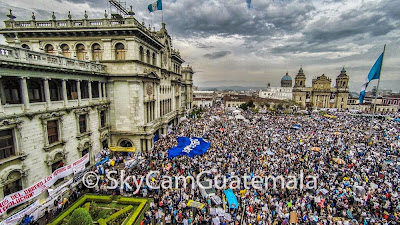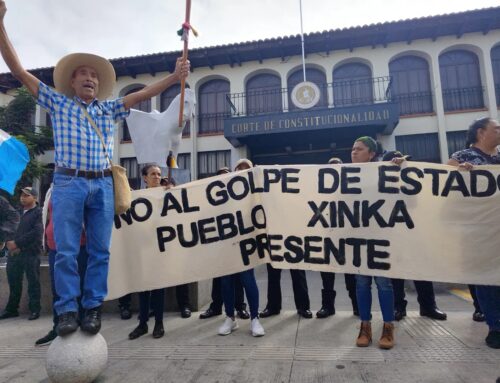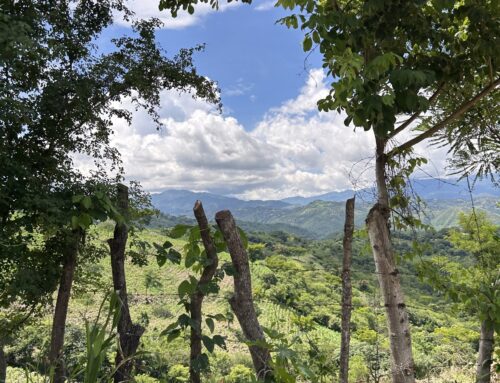 |
Tens of thousands gather in Guatemala’s central park to demand an end to impunity
and corruption. Photo credit: SkyCam Guatemala |
A crime ring that defrauded the Guatemalan national tax collection agency (SAT) and customs office, and implicated high-level authorities in different government institutions all the way up to Vice President Roxana Baldetti’s private secretary, was dismantled on April 16th with the arrests of 22 people. Guatemala’s Public Prosecutor’s Office and the International Commission Against Impunity in Guatemala (CICIG) carried out the joint investigation, which immediately sparked massive and ongoing public protest and political crisis. The VP’s private secretary, Juan Carlos Monzón Rojas, is still at large.
While the investigation into the criminal network known as “La Linea”, has yet to explicitly name Vice President Baldetti, suspicions of her involvement in criminal activity were immediately raised after the arrest warrant for Monzón was issued while he was traveling with the VP in South Korea. Baldetti lied publically about her return to Guatemala from said trip and Monzón has been on the run ever since. On May 8th, after popular protests the size of which had not been seen in recent Guatemalan history and pressure from the powerful economic sector CACIF, Vice President Baldetti resigned. With resignation also comes the end of immunity for Baldetti, opening the doors to a full investigation into her involvement in the corruption case.
Reverberations of the “La Linea” corruption scandal have also been felt in other cases, including the April 30th request by the CICIG and Guatemalan Public Prosecutor’s office to withdraw Judge Carol Patricia Flores’ immunity from prosecution.
Flores, whose rulings led to the current quagmire of Guatemala’s genocide case against Efraín Ríos Montt and José Mauricio Rodríguez Sánchez, is being investigated for money laundering, illicit enrichment and other crimes. Also caught up in the fallout of the current political crisis is head of the Ministry of Energy and Mines, Erick Archila, who resigned on May 15th. Archila is facing allegations of corruption, money laundering and anomalies in the granting of government contracts and is under investigation for his handling of
contracts for the proposed Xalalá dam project.
Guatemala’s new Vice President: An old face from the extreme right
A little over a month after the scandal broke, Guatemala now has a new Vice President. President Pérez Molina, tasked with submitting a slate of three candidates to Congress, struggled to put together his list after two proposed candidates withdrew. In the end, Héctor Alejandro Baltazar Maldonado Aguirre was the last candidate to be added to the list and was approved by Congress. Maldonado Aguirre is not a new figure in Guatemalan politics, rather has a long history of representing the extreme right – a founder of the Movimiento de Liberación Nacional or the National Liberation Movement (MLN), a political party known for promoting organized violence and death squadrons during the 1960s-70s.
From there, Maldonado Aguirre went on to serve as the Guatemalan representative to the United Nations during the military government of Romeo Lucas García during which time the Guatemalan government worked hard to convince the international community that it was not participating in massive human rights violations. Maldonado Aguirre was later the Minister of Education during the military government of Carlos Arana Osorio and ran for president in 1982 as a candidate for the National Renewal Party, a slightly less extreme version of the MLN. He was finally elected as a member of the Constitutional Court in 1986-1991, returning again to the position in 2006 and reelected to the Court by Congress once more in 2011.
According to
Gustavo Illescas of Guatemalan Independent Media (CMI-G), “Thanks to his discursive capacity to present the ideas of the extreme right in a moderate way, Maldonado Aguirre has been called upon in various moments of his life to deflect the tensions that have been provoked by the violent actions of the State and during the political crises that develop as a result.”
In Guatemala, these violent actions and political crises have often revolved around crimes committed during the internal armed conflict and the unwavering effort to bring those responsible to justice. Examples of Maldonado Aguirre’s role as a “Fire extinguisher of Justice” are outlined in
an article by CMI-G and include: delaying investigations for one year in the case for the 1998 murder of Archbishop Gerardi in order to protect Byron Lima Oliva, a member of the Presidential General Staff (EMP, Estado Mayor Presidential) and authoring the judicial resolution that allowed former General Efraín Ríos Montt to avoid extradition to Spain where he would have been tried for genocide and terrorism.
After being reelected to the Constitutional Court again in 2011, Maldonado Aguirre played a key role in yet three more extremely controversial decisions, decisions that have had very real consequences on access to justice and the future of judicial independence in the country. First, voting to annul the historic genocide sentence in May 2013 and one year later, voting for the early removal of Attorney General Claudia Paz y Paz from her position. Finally in November 2014, Maldonado Aguirre voted to approve a judicial nomination process that was plagued with anomalies, in which both the CICIG and the US Embassy expressed serious concern about the trafficking of influences and the impartiality of the process.
“Maldonado resolves crisis for the right. This is his trump card. In order to have been chosen [as Vice President] he had to have the approval of the US Embassy and of CACIF, and even though it means conservative groups are left without an important player inside the Constitutional Court, he will play an important role in the coming months of this crisis. It is doubtful, however, that this decision will be enough to deflate the protests programmed in various parts of the country for Saturday the 16th or to diminish the feeling of indignation that is blooming toward #OtraGuatemalaYa – #AnotherGuatemalaNow.” Gustavo Illescas, CMI-G.







[…] papel en un escándalo de corrupción aduanera a gran escala conocido como La Línea. Despertó la mayor masa manifestaciones en la historia reciente de Guatemala, durante las cuales los manifestantes salieron […]